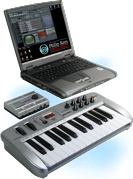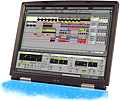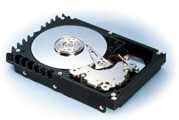
 | ||||||
 | ||||
If you may be interested in low prices, take a look at the limited availabilty special offers on computer music products in our STOCK CLEARANCE Bargain List. |
 With the capabilities of modern music software, it is now possible to perform the entire music production process inside a computer system. This means it should be possible to use laptop computers (or notebook computers) as very portable complete mobile studios.
With the capabilities of modern music software, it is now possible to perform the entire music production process inside a computer system. This means it should be possible to use laptop computers (or notebook computers) as very portable complete mobile studios.
 The chipsets (which join things together electronically) used in many laptop computers are from suppliers such as VIA and SIS. While these are certainly adequate for officey stuff, they have tended not to be quite up to meeting the demands of serious music-making hardware. Like many of the manufacturers of this specialist hardware, we strongly recommend the use of laptop computers with Intel® chipsets (and consequently Intel® processors). Intel® are closely involved in the development of important interconnection standards like PCI and USB. As a result, their implementations tend to be regarded as definitive — that is, if a peripheral device doesn't work properly with an Intel® PC chipset, the device is considered at fault, whereas if the problem occurs with the other contenders, the PC chipset may get the blame. We select laptop computers made from solid, trustworthy bits, and test them ourselves in th UK for compatibility with music software and hardware.
The chipsets (which join things together electronically) used in many laptop computers are from suppliers such as VIA and SIS. While these are certainly adequate for officey stuff, they have tended not to be quite up to meeting the demands of serious music-making hardware. Like many of the manufacturers of this specialist hardware, we strongly recommend the use of laptop computers with Intel® chipsets (and consequently Intel® processors). Intel® are closely involved in the development of important interconnection standards like PCI and USB. As a result, their implementations tend to be regarded as definitive — that is, if a peripheral device doesn't work properly with an Intel® PC chipset, the device is considered at fault, whereas if the problem occurs with the other contenders, the PC chipset may get the blame. We select laptop computers made from solid, trustworthy bits, and test them ourselves in th UK for compatibility with music software and hardware.
 The processor is the component which actually manipulates data in accordance with the instructions in a computer program. PC processors are now well and truly fast enough to execute many of these instructions within the tiny fraction of a second which is the sample period of a digital audio stream. This means that the PC processor can actually work on the audio data, and this is called native digital signal processing (DSP). Native DSP is the big reason that we can now do such amazing things with audio (like software synthesisers and effects) on a general-purpose computer. This does mean, however, that we want machines with fast processors. Modern PC processors are thoroughly overspecified for office productivity work, but our applications can really make use of the extra processing power. The faster the processor, the more software synths or effects we can run at the same time, without overloading the processor.
The processor is the component which actually manipulates data in accordance with the instructions in a computer program. PC processors are now well and truly fast enough to execute many of these instructions within the tiny fraction of a second which is the sample period of a digital audio stream. This means that the PC processor can actually work on the audio data, and this is called native digital signal processing (DSP). Native DSP is the big reason that we can now do such amazing things with audio (like software synthesisers and effects) on a general-purpose computer. This does mean, however, that we want machines with fast processors. Modern PC processors are thoroughly overspecified for office productivity work, but our applications can really make use of the extra processing power. The faster the processor, the more software synths or effects we can run at the same time, without overloading the processor.
Choosing a faster processor will increase power consumption, which reduces battery life and makes the machine noisier (as it needs more cooling).
The Intel® Pentium M processor, as used in Centrino laptop computers is an excellent choice for mobile music and audio systems. They use far less power than equivalent desktop processors with comparable performance. This means that Pentium M systems need less fan cooling, so that they are quieter; they are also more portable. The Pentium M exhibits excellent performance and compatibility with music software. For UK delivery, you can configure your own Pentium M laptop computer system for music on this website.
Apart from processor speed, other important parameters are screen size and resolution, internal hard disk drive size and speed, the size of the memory (RAM) and connectivity (what sockets are provided for connecting peripherals).
 A 15 inch flat LCD screen (nowadays called TFT) has about the same screen area as a nominally 17 inch CRT. This size is adequate for most music making, but should now be considered the minimum acceptable. At the time of writing, the minimum resolution you should accept is 1024 x 768 pixels, more pixels means you can get more detail on your screen.
A 15 inch flat LCD screen (nowadays called TFT) has about the same screen area as a nominally 17 inch CRT. This size is adequate for most music making, but should now be considered the minimum acceptable. At the time of writing, the minimum resolution you should accept is 1024 x 768 pixels, more pixels means you can get more detail on your screen.
Many laptops use graphics interfaces which are part of the motherboard chipset and share system memory. For music systems, we prefer to avoid the potential contention for access to system memory. Therefore, we generally recommend systems with separate graphics interfaces with their own dedicated memory - though this is a more costly option.
 Compared to their bigger desktop brothers, hard drives for laptop computers (notebook computers) are slow, expensive and lack capacity. Even so, they do the job. At the time of writing, we generally recommend 60Gb as a sensible size, mainly in terms of cost-effectiveness. You might need up to 10 Gb for your operating system and applications. After this you need to store your working data — all the files for a single tune are unlikely to exceed about 1Gb.
Compared to their bigger desktop brothers, hard drives for laptop computers (notebook computers) are slow, expensive and lack capacity. Even so, they do the job. At the time of writing, we generally recommend 60Gb as a sensible size, mainly in terms of cost-effectiveness. You might need up to 10 Gb for your operating system and applications. After this you need to store your working data — all the files for a single tune are unlikely to exceed about 1Gb.
The faster the head on a disk drive can move, the less time it needs for the head to find the desired data; this is called seek time and it is the main component of access time. If the audio data we need is not available at the time we need it, we get a glitch or dropout. This is the most important parameter in audio multitracking on a PC. Look for an average access time of 13ms or better.
The faster the disk spins in a disk drive, the less time it has to take for the desired data to pass under the head. This is the rotational speed, and we recommend going for at least 5400 rpm (revolutions per minute) for a notebook hard drive. Notebook hard drives generally spin slower than desktop drives, which is basically an issue of power consumption and heat dissipation. If you expect to use twenty or more simultaneous audio tracks, you should consider paying the extra for a 7200 rpm drive.
If you expect to be doing serious audio multitrack recording, consider having multiple hard drives (which can be fitted to some of the larger 'desktop replacement' laptops). This helps audio data streaming in several wonderful ways. If you can't fit any extra drives into your notebook carcase, then external hard drives are available. We recommend those that use IEEE-1394 (aka FireWire and i.Link) connections, especially if your USB connections are simultaneously being used for audio interfaces.
 At the time of writing, for a PC running audio applications under Windows XP, we generally recommend 1Gb (1024Mb) of system memory (RAM). You should not now consider less than 512Mb. In a laptop, more than 1Gb (2Gb is usually now possible) is still somewhat expensive and you will often not see much benefit. Extra memory will increase power consumption, which reduces battery life and makes the machine noisier (as it needs more cooling).
At the time of writing, for a PC running audio applications under Windows XP, we generally recommend 1Gb (1024Mb) of system memory (RAM). You should not now consider less than 512Mb. In a laptop, more than 1Gb (2Gb is usually now possible) is still somewhat expensive and you will often not see much benefit. Extra memory will increase power consumption, which reduces battery life and makes the machine noisier (as it needs more cooling).

You should also make sure that the laptop you choose provides an adequate number of ports for IEEE-1394 (FireWire or i.Link), USB2 and maybe PCMCIA. You will need these connections to connect the peripherals that will be required to complete your mobile studio system. To be sure of compatibility with USB audio devices, we recommend that you make sure that (at least some of) your USB ports are implemented with Intel integrated circuits.

![]() to Phil Rees Music Tech UK home page
to Phil Rees Music Tech UK home page
![]() to Phil Rees Music Computers division index page
to Phil Rees Music Computers division index page
![]() subscribe to the Phil Rees Music Tech email newsletter
subscribe to the Phil Rees Music Tech email newsletter
© 2003 Philip Rees, UK
This document is not to be reproduced without permission of the author.
No liability can be accepted for errors and omissions.
All trademarks acknowledged as the property of their owners.